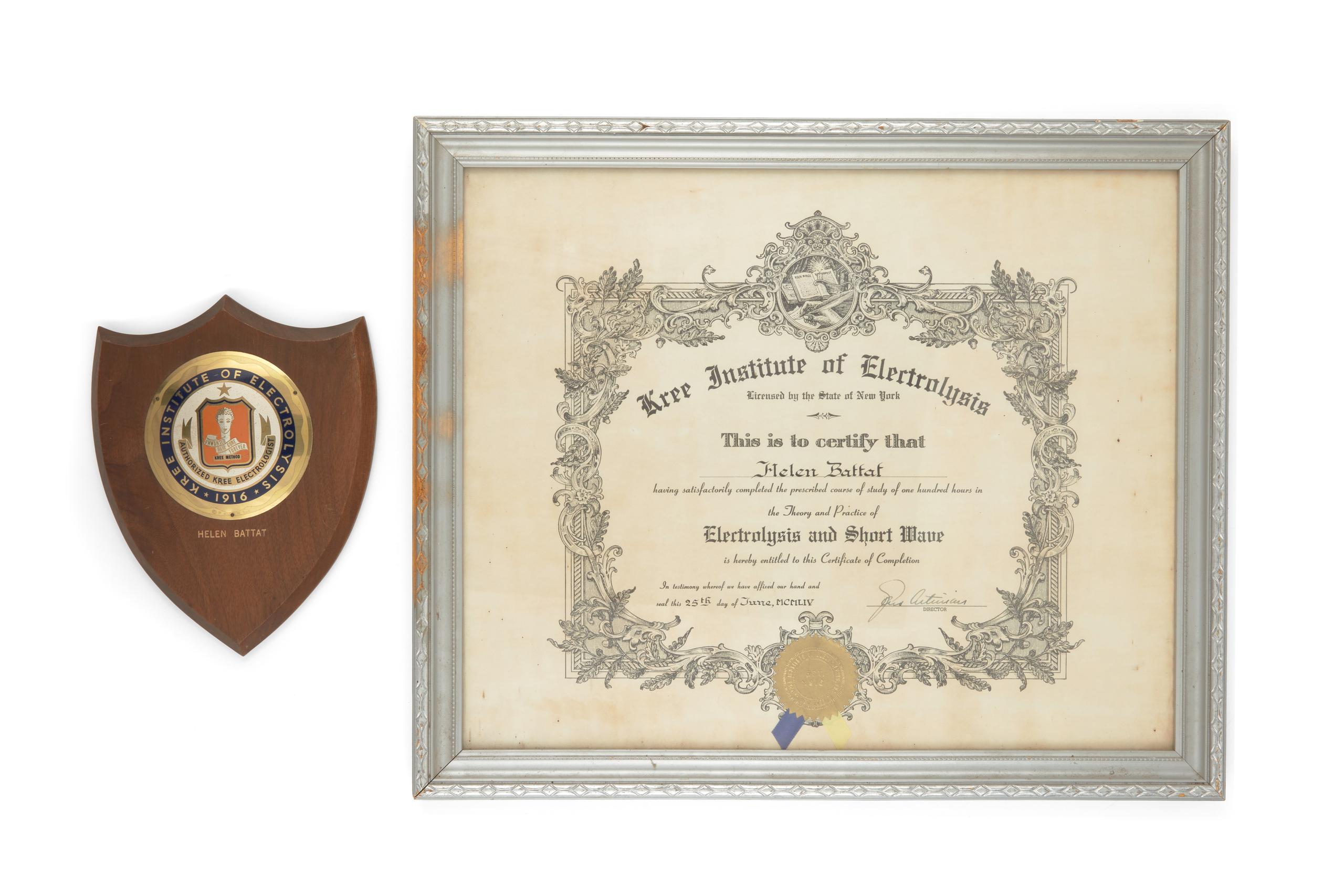
Object No. 2010/81/2
1954
The first recorded use of electrolysis as a method of hair removal is attributed to Dr Charles E. Michel of St Louis, Missouri, USA, for his use of electrolysis in the treatment of ingrown eye lashes in 1875. In the 1880s, Dan Mahler established an electrolysis practice in North America, and that company still trades as the Instantron Company in Rhode Island, USA, manufacturing and supplying electrolysis machines and other forms of hair removal. In 1916 American inventor Paul Kree - whose company manufactured this particular machine - developed an electrolysis unit that was both relatively safe to use, and quite effective. Galvanic electrolysis is a method of damaging the hair follicle at the very base of the hair, just beneath the skin, with an applied electric current, causing the hair growth to slow profoundly and even cease altogether. Kree's main advancement in electrolysis was the use of needles in the application of the current. Varying technologies in electrolysis have been developed through the 1900s and into the 2000s. This unit is an example of the early, but still sophisticated, design, manufacture and supply of this form of hair removal machine. Although contemporary units feature many more options and offer better control and safely, the Kree machine illustrates that fundamentally - considering the length of time the practice has been around - little has changed since Kree introduced needles to the practice. The major advancement in electronic hair removal has come with the development of laser hair removal. Laser, or Light Amplification by Stimulated Emission of Radiation, focuses light in a way which greatly increases the energy it omits. Laser hair removal works in a similar way to electrolysis in that it damages the hair follicle by focusing a high dose of energy specifically on that area. Although now considered more reliable, painless and much faster than electrolysis, electrolysis is still the only hair electronic hair removal method that can parentally remove fine or very light coloured hair. Damian McDonald October 2010
Loading...
Summary
Object Statement
Certificate in electrolysis and award plaque, paper / glass / wood, made by Kree Institute of Electrolysis, New York, New York, United States of America, 1954
Physical Description
Certificate in electrolysis and award plaque, paper / glass / wood, made by Kree Institute of Electrolysis, New York, New York, United States of America, 1954 The certificate features wording certifying that Helen Battat has qualified in a course of the application of electrolysis as a means of hair removal at the Kree Institute of Electrolysis in New York. The certificate is ornately bordered, and it has been framed in a glass plate and wood frame. The award is a metal plaque mounted on a wood backing cut in the shape of a shield. The award states that Helen Battat is an authorized electrologist.
PRODUCTION
Notes
The certificate and award plaque were made for the Kree Institute of Electrolysis, New York, USA. The certificate was framed by the donor.
HISTORY
Notes
The original owner of this certificate in electrolysis and award from the Kree Institute of Electrolysis, Ms Helen Battat, immigrated to Australia in her mid thirties, after living in several countries around the world. She was born in Baghdad, where her family left on Red Cross papers in the early 1930s. She was educated in Japan at English schools, and then lived in many countries such as India, Shanghai, Japan, Italy and America before finally settling in Australia. She spoke the languages of many of the countries that she lived, and always mastered their cuisine. She married a family friend in Bombay India at nineteen and she had her first two children there, a daughter and a son. Then soon after, had her third child in Shanghai, a son. Her husband, herself and her three children immigrated to Melbourne, Australia in the hope of finally settling - which they did. Here she had her forth and last child in 1959, a girl. At first the family lived in Balwyn, then Boxhill, and then moved to Elwood in the early 60's; and she stayed there through to December 2009 - when she died in the family home. Although she never worked, she had a passion for all crafts of the kitchen and was a great cook. She also loved all things beauty related and took great pride in her appearance. It was this interest that had her study electrolysis at the Kree Institute of Electrolysis in New York. She did electrolysis work on friends for pocket money in Australia, but that was really the sum of her activities with the machine.
SOURCE
Credit Line
GiftHelen Battat
Acquisition Date
CopyrightImage Licensing Enquiry
Image Licensing Enquiry
Object Enquiry






































